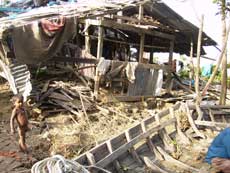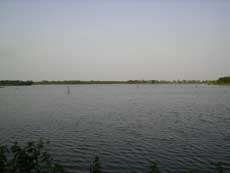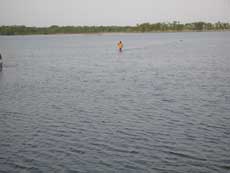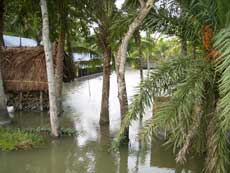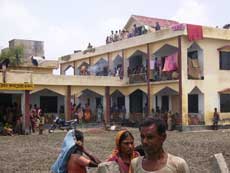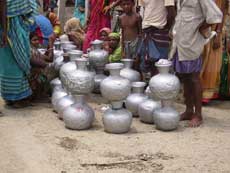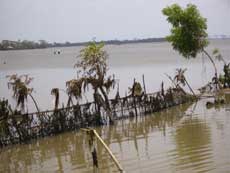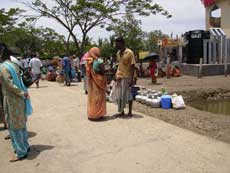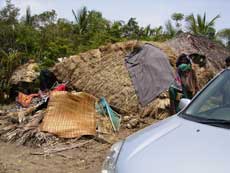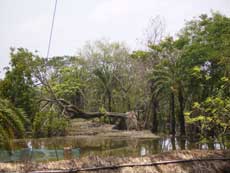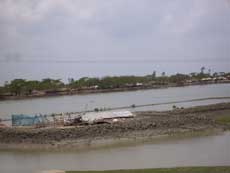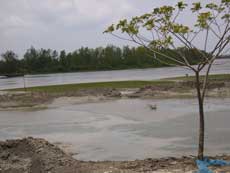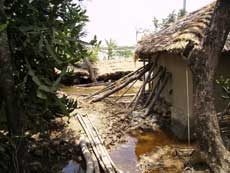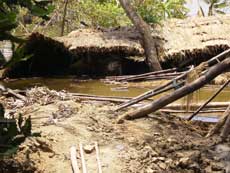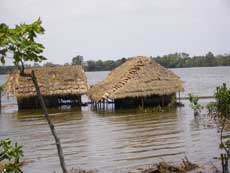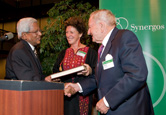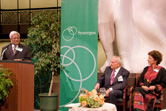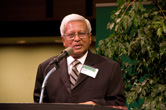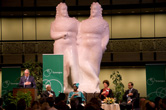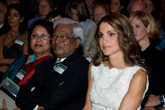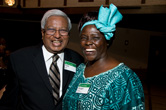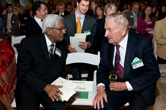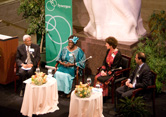
English (959)
Children categories
Kidnapped BRAC Afghanistan Staff Released
02 November 2008, Dhaka. The two BRAC staff members who were kidnapped in Afghanistan last week have been released. BRAC Afghanistan area managers Akhter Ali and Mohammad Shahjahan Ali, who were abducted on 23 October from Ghazni, Afghanistan, were left in front of BRAC’s Ghazni office on Saturday evening by their captors. BRAC Afghanistan officials, who found Akhter and Shahjahan to be in good health, conveyed them to the head office in Kabul on Sunday morning. The two released staff members have since been in contact with their families in Bangladesh and BRAC is working to bring them back home as soon as possible.
The BRAC chairperson expressed great relief and joy at the release of the two BRAC staff members. In separate letters, he thanked the Government of Bangladesh, in particular the Ministry of Foreign Affairs, the Government of Afghanistan, in particular the Ministries of the Interior and Rural Rehabilitation and Development, the Afghanistan Embassy in Dhaka and the Ghazni authorities for their prompt action in securing the release of Akhter and Shahjahan.
Mr. Abed pledged that BRAC will continue to put maximum effort in ensuring the safety of all its staff members in Afghanistan as well as in the other countries where it operates.
BRAC and MasterCard Foundation Expand Microfinance Services in Uganda
19 November 2008, Dhaka. BRAC and the MasterCard Foundation announced yesterday a $19.6 million programme to expand financial services to the poor across Uganda, benefiting approximately 2 million people. The programme will provide economically active women in Uganda with loans, training and technical support to enable them to improve their livelihoods. Additionally, the programme will expand vocational and life-skills education for adolescent girls. As part of this programme, BRAC will also explore the feasibility of becoming a regulated deposit-taking institution in Uganda, a role it has not yet played in Africa.
This initiative will demonstrate for the first time the full potential of BRAC’s holistic microfinance approach to reduce poverty and improve livelihoods in Africa. Insights generated from this programme will enable BRAC to accelerate its long-term plan to adapt this approach for other African countries.
“The MasterCard Foundation is working with innovators like BRAC to expand the access and reach of microfinance services to the poor, supporting their entrepreneurship so they can improve their own lives and communities,” said Reeta Roy, President and CEO of The MasterCard Foundation.
“This initiative with The MasterCard Foundation will be our largest programme in Africa,” said Fazle Abed, Founder and Chairperson of BRAC. “What we learn in Uganda, including how to provide savings to poor women and their communities, will help us rapidly scale up our operations to provide services to millions of people throughout Africa.”
BRAC is poised to become one of Uganda’s most effective institutions serving significant numbers of rural households. The government of Uganda has made expanding financial services to the rural poor one of its top priorities. More than 37 percent of Uganda’s population live on less than a dollar a day and 62 percent do not have access to financial services.
It may be mentioned here that BRAC is one of the world’s leading providers of microfinance services and its approach, “microfinance multiplied” increases the ability of poor clients to productively use their loans to augment their incomes, and build their assets, as well as stimulate economic and social development within their communities. BRAC recognizes the need of poor people to have a secure place to save their money and the role of savings in sustainable microfinance.
ABOUT THE MASTERCARD FOUNDATION
The MasterCard Foundation is an independent, private foundation based in Toronto, Canada. It was established through the generosity of MasterCard Worldwide customer financial institutions at the time of the company’s initial public offering in 2006. The Foundation has more than $1 billion in assets. Its vision is to make the economy work for everybody by advancing effective and innovative programmes in the areas of microfinance and youth education. For more information, go to www.themastercardfoundation.org
BRAC marks FI2020 week with nationwide dialogue on microfinance

According to the World Bank an estimated 2 billion working-age-adults do not have an account at a financial institution.
To build global momentum around how to address the remaining gaps in financial inclusion, the Financial Inclusion 2020 campaign celebrated FI2020 week from 2-6 November.
A worldwide event, FI2020 week involved over 25 partners who each organised conversations on how to make significant steps to advance financial inclusion. The range of participants included banks, policy makers, NGOs, microfinance institutions, investors, and financial capability experts.
The only partner from Bangladesh, BRAC seized the opportunity by launching a nation-wide dialogue with local government leaders on how microfinance is contributing to alleviating poverty in the country. Across the 64 districts of Bangladesh, deputy commissioners- representatives of local government- were invited to visit BRAC’s microfinance operations. They gained better appreciation of how microfinance empowers the poor, especially women, and how the provision of financial services serve as cross-cutting tools that complement the government's work towards the sustainable development goals.
The nation-wide engagement with local government is hoped to nurture the supportive environment that government has enabled for microfinance institutions to function. During his visit, the deputy commissioner of Chittagong Mesbah Uddin said, “Customised financial services reach out to those who remain unbanked. Besides providing economic opportunities, BRAC’s microfinance addresses gender inequality, legal and human rights and financial education.”
During FI2020 week, BRAC also organised a debate among its staff on how microfinance fits into BRAC’s broader model of development. The main purpose of the discussion was to share insights into how financial services help the poor to cope with poverty, and ways in which BRAC could continue to improve its microfinance model in its mission to alleviate poverty.
Executive director of BRAC, Dr Muhammad Musa, who moderated the debate, observed, “As an organisation, when we work towards eradicating extreme poverty and helping individuals realise their potential, we need precise tools like microfinance to offer a more complete package of services to our clients. In a changing world we need to adjust, re-adjust, sharpen and strengthen microfinance so that it impacts a wider group of people.”
BRAC is a leading provider of financial services for the poor in seven countries including Bangladesh, Tanzania, Liberia, Uganda, Sierra Leone, Myanmar and Pakistan. Its ‘credit-plus’ approach addresses the specific needs of the various target populations such as rural women, adolescents, landless poor, marginal farmers, migrant workers, urban poor and small entrepreneurs. As it expands its microfinance programme BRAC’s strategy of financial inclusion serves to complement its other programmes such as health and education, while keeping client protection at its centre. Access to financial services is a core element of BRAC’s holistic approach to development, helping households to save, consume, and work with convenience and dignity.
Relief Activities by BRAC for the Cyclone Aila Affected People
27 May 2009, Dhaka. The recent cyclone Aila caused massive destruction and devastation in the southern and south-western part of Bangladesh. BRAC, as an immediate response to this calamity has approved Taka 1 (one) crore from its own fund for primary relief activities. BRAC has already started to distribute pure drinking water, water purifying tablets, rice flakes and molasses in the affected region. For coordination and the smooth operation of the relief activities one of the Directors from BRAC Head Office is already working in the cyclone affected areas as well as all BRAC staffs of the affected Upazillas are engaged in these relief activities. Necessary steps to mobilise more funds for the victims are being taken by BRAC.
BRAC Founder Fazle Abed to Receive Rockefeller Leadership Award
12 September 2008, Dhaka. BRAC founder and chairperson Fazle Hasan Abed has been selected by the Synergos Institute to receive the David Rockefeller Bridging Leadership Award for his innovate work to empower poor people, help them enjoy their basic human rights and enhance their opportunities to secure a better future. The award, which will also be presented this year to Queen Rania Al Abdullah of Jordan, will be given at an event in New York on the 23rd of September.
The David Rockefeller Bridging Leadership Award is presented each year by Synergos to extraordinary leaders who have shown vision and courage in bringing people together to address the most critical issues of our time. The first such honoree was David Rockefeller, for whom the award is named. Last year, the award was presented to former South African President Nelson Mandela as well as the Co-Chairs of the Bill & Melinda Gates Foundation, Bill Gates, Melinda Gates and William Gates Sr.
BRAC Founder Fazle Abed receives Rockefeller Leadership Award
Two BRAC Staff Abducted in Afghanistan
25 October 2008, Dhaka. Two BRAC staff members, Akhter Ali and Mohammad Shahjahan Ali, were kidnapped last Thursday, 23 October, from the Ghazni province of Afghanistan, where they have both been working as BRAC Afghanistan Area Managers for the last three years. The BRAC Afghanistan authorities in Kabul have confirmed the following details of the incident: Akhter and Shahjahan were abducted at gunpoint by four men from BRAC Afghanistan’s Moi Mobarok branch office in the provincial capital, Ghazni City, where they had travelled as part of their regular office visit schedule. During the attack, the manager of the branch office, Hasmatullah, an Afghani national, was also severely beaten. The identities of the attackers are yet to be confirmed.
In immediate response, BRAC Afghanistan authorities contacted the Afghani Minister of Interior, Hanif Atmar, Thursday night to inform him of the incident. Mr. Atmar assured BRAC that the Afghan authorities would provide all necessary support in rescuing the two BRAC staff members. He also communicated with his Advisor of Security and conveyed a message to the Ghazni police. BRAC Afghanistan authorities also informed the United Nations Assistance Mission in Afghanistan and the Afghan Ministry of Rural Rehabilitation and Development of the incident and are now in continuous communication with the Afghan authorities regarding the matter.
A high level team has been sent to Ghazni from the BRAC Afghanistan head office in Kabul to gather information and to liaise with the Afghani authorities, including the Governor and Chief Security Officer of Ghazni. Senior BRAC Afghanistan officials will also meet with the Afghan Minister of Rural Rehabilitation and Development, Ehsan Zia, on Sunday.
BRAC officials in Bangladesh have been in communication with the families of Akhter and Shahjahan, keeping them informed of the latest situation and providing all necessary support.
Ghazni is one of thirty-four provinces of Afghanistan, with its capital in Ghazni City. The province lies in the eastern part of the country, south-west of Kabul. BRAC Afghanistan has been working in Ghazni for the last three years. Telephone networks in Ghazni have been inoperative for the last four days, making communication extremely difficult.
BRAC Officials meet with Foreign Adviser to discuss Afghanistan Kidnapping
26 October 2008, Dhaka. BRAC Executive Director of Overseas Programmes, Md. Aminul Alam, and Director, Public Affairs & Communications, M. Anwarul Haq attended a meeting on Sunday afternoon with the Foreign Affairs Adviser to the Government of Bangladesh, Iftekhar Ahmed Chowdhury, and the Afghan Ambassador to Bangladesh, Ahmad Karim Nawabi, to discuss the abduction last Thursday of the two BRAC Afghanistan area managers in Ghazni, Afghanistan. The BRAC senior officials urged the Bangladeshi government to extend all possible collaboration in their efforts to secure the release of the kidnapped staff members. The Foreign Affairs Adviser assured that all cooperation will be extended by the Foreign Ministry and also made an appeal to the Afghanistan government, through the Ambassador, to extend its support.
Speaking to the media following the meeting, Md. Aminul Alam said that while BRAC’s activities would continue in Afghanistan, the organisation will work to build the capacity of its Afghan staff members so that it can withdraw all Bangladeshi employees within five years.
Earlier, senior BRAC Afghanistan officials, including the country programme coordinator Md. Fazlul Hoque, met with the Afghan Minister of Interior, Hanif Atmar, Saturday evening to discuss the matter. Mr. Atmar assured the BRAC officials that he has been taking all necessary action to rescue the abductees. During the meeting, he requested Afghan security and intelligence authorities to look into the matter.
Meanwhile, BRAC officials in Bangladesh continue to be in constant communication with the families of Akhter and Shahjahan. Md. Aminul Alam met with the wives and other family members of Akhter Ali and Mohammad Shahjahan Ali at the BRAC head office in Mohakhali on Sunday afternoon.
Rescue attempts of abducted BRAC staff intensified
29 October 2008, Dhaka. Rescue attempts of the two abducted BRAC staff members in Afghanisan have been intensified. Jalaluddin Ahmed, BRAC Health Programme Head who was previously the Country Programme Head of BRAC Afghanistan will be traveling to Afghanistan tonight to oversee the rescue efforts in Ghazni. Meanwhile in Dhaka, BRAC senior officials continue to be in contact with the families of the two abducted BRAC staff members.
Meanwhile, Shahabuddin Ahmed , General Manager -BRAC Afghanistan, who is currently in Ghazni has established contacts with the Local Governor and Senior Officials there and discussed the situation. The local security authority of Ghazni is also working for the rescue of BRAC employees.
In Bangladesh, Aminul Alam Executive Director – BRAC Overseas Programmes, met with the family members of the kidnapped BRAC staff members Akhter Ali and Mohammad Shahjahan Ali today. He updated them with the ongoing rescue operations being implemented by BRAC. Shafiqul Islam, Director, BRAC Education Programme , was also present in the meeting.
It maybe mentioned, BRAC Afghanistan’s Regional Managers Akhter Ali and Mohammad Shahjahan Ali were kidnapped last Thursday, 23 October, from Ghazni province of Afghanistan.
BRAC Officials meet with Foreign Adviser to discuss Afghanistan Kidnapping
26 October 2008, DHAKA – BRAC Executive Director of Overseas Programmes, Md. Aminul Alam, and Director, Public Affairs & Communications, M. Anwarul Haq attended a meeting on Sunday afternoon with the Foreign Affairs Adviser to the Government of Bangladesh, Iftekhar Ahmed Chowdhury, and the Afghan Ambassador to Bangladesh, Ahmad Karim Nawabi, to discuss the abduction last Thursday of the two BRAC Afghanistan area managers in Ghazni, Afghanistan. The BRAC senior officials urged the Bangladeshi government to extend all possible collaboration in their efforts to secure the release of the kidnapped staff members. The Foreign Affairs Adviser assured that all cooperation will be extended by the Foreign Ministry and also made an appeal to the Afghanistan government, through the Ambassador, to extend its support.
Speaking to the media following the meeting, Md. Aminul Alam said that while BRAC’s activities would continue in Afghanistan, the organisation will work to build the capacity of its Afghan staff members so that it can withdraw all Bangladeshi employees within five years.
Earlier, senior BRAC Afghanistan officials, including the country programme coordinator Md. Fazlul Hoque, met with the Afghan Minister of Interior, Hanif Atmar, Saturday evening to discuss the matter. Mr. Atmar assured the BRAC officials that he has been taking all necessary action to rescue the abductees. During the meeting, he requested Afghan security and intelligence authorities to look into the matter.
Meanwhile, BRAC officials in Bangladesh continue to be in constant communication with the families of Akhter and Shahjahan. Md. Aminul Alam met with the wives and other family members of Akhter Ali and Mohammad Shahjahan Ali at the BRAC head office in Mohakhali on Sunday afternoon.
A change of hearth
25 September 2008, Dhaka. Politicians of Bangladesh who have used the state apparatus to further the interests of their own and those of their cronies keep making news because of their corrupt deeds.
Over the past 35 years, a section of the country’s urban middle class has also amassed wealth through dishonest means.
Even as several corrupt politicians are either brought to justice or forced to be on the run, the country is in search of the right leader and the right formula for the future.
The fate of more than 80 per cent of Bangladesh’s 145 million people — deprived of proper education, sanitation and healthcare facilities and other basic needs — is also gradually changing for the better.
Over the years, the rural poor have remained left out of any plan for development.
They were, in fact, left to the mercy of God and a handful of non-government organisations.
One of these, the Bangladesh Rural Advancement Committee (BRAC), which is the world’s largest in terms of reach, has been training Bangladesh’s rural poor on education, sanitation, nutrition and healthcare since its inception in 1972, right after the independence of Bangladesh.
Focus on back of beyond
BRAC is now focusing on how to save the rural poor from the recent food crisis, at a time when the global economy is trying to come to terms with high oil prices and shortage of food.
“Just grow more food per hectare and use better quality seeds that will ensure better yield," Fazle Hasan Abed, a Bangladeshi social entrepreneur and BRAC’s founder and chairperson, told Weekend Review in an interview recently.
“Increased productivity in the agricultural sector with better quality seeds could help most agriculture dependent economies to become self-sufficient in food.”
While some economists struggle to assess the magnitude of the situation and find out what went wrong with capitalism, Abed is helping his compatriots cope with the crisis.
“Chinese farmers produce eight tonnes of rice per hectare while we grow only five in Bangladesh.
"If we can match the Chinese efficiency, countries such as Bangladesh will be able to meet the growing food demand and be able to store for the future,” he says.
Forbes recently ran a feature on Abed, saying he should have been considered for the Nobel prize. Many in Bangladesh share this view. The belief gained strength after Mohammad Yunus won the Nobel prize in 2006.
Born in 1936 in Bangladesh, Abed is the son of a rich landowner. He was educated in the Dhaka and Glasgow universities.
The 1971 Liberation War of Bangladesh had a profound effect on Abed, then a professional accountant in his thirties holding a senior corporate executive’s position at Shell Oil in Chittagong.
The war changed the direction of his life. In the face of the brutality and agony of war, the comforts and perks of a corporate executive’s life ceased to have any attraction for Abed.
As the then East Pakistan was under virtual occupation, Abed left his job and went to London to devote himself to the Liberation War of Bangladesh.
There Abed helped initiate a campaign called Help Bangladesh to organise funds for the war effort and raise awareness in the world about the genocide in his homeland.
Abed launched BRAC in 1972 to help rebuild a nation ravaged by a nine-month war that claimed 3 million lives and displaced 10 million.
He sold his property in the United Kingdom for $17,000 and invested the money in BRAC, leading him on a difficult journey that eventually succeeded.
Since then, his organisation has engaged itself in a silent revolution by providing rural healthcare, education and income-generating schemes to millions of poor people in a country where the birthrate averaged seven children per mother.
Poverty eradication
“Poverty eradication helps people access knowledge and credit and empowers them to become consumers," Abed says.
“We will disburse more than $1.2 billion in microfinance this year to more than 7.4 million borrowers in Bangladesh.
"We have brought 120 million people within our reach during the past 35 years, including 110 million in Bangladesh.
"This makes BRAC the world’s largest NGO in terms of reach. We are not the richest but the largest. We are also the only southern NGO that has gone global.”
BRAC has a presence in Pakistan, Afghanistan, Tanzania, Sudan, Liberia and Sierra Leone.
It has a network of 33 offices in Pakistan with 1 million borrowers. BRAC has a strong social development network across 23 of Afghanistan’s 34 provinces.
Population explosion had at one stage become the biggest threat to Bangladesh’s economic growth.
In 1977, the Bangladesh government identified population growth as a national problem, gradually helping to bring down the growth rate to 1.7 per cent.
Through BRAC and other NGOs, the Bangladesh government and large international donors have made cheap contraceptives available to millions of couples and educated them to use these products, breaking a social taboo.
Use of contraceptives and prevention of childbirth was considered an act against God’s will in parts of Bangladesh, which fuelled the high birthrate.
“We have managed to bring down the birthrate per mother to 2.7 from 7 in the 1970s,” Abed says.
In 1979, about 135 infants out of 1,000 in the country died before their first birthday and 250 before reaching 5.
Cuting down mortality
“Over the past 35 years, we have been able to help cut down mortality among infants and children. This has come down to 65 per thousand, which we are trying to reduce further,” he says.
“Survival of children cuts the propensity of a mother’s desire to have more children. As the child mortality rate was high, couples used to have more children, so that [at least] a few would survive.”
BRAC has brought more than 80 million Bangladeshis under its healthcare programme. “Bangladesh has been the most successful in this area. No other country has managed to achieve this so fast.”
If population is topmost on the list of Bangladesh’s priorities, then education and empowerment of people should come second.
However, both these tasks have proved to be huge challenges. BRAC has a network of 52,000 informal schools through which it provides basic education to more than 1.5 million students.
Bangladesh has 19 million students between the ages of 6 and 10. About 15 million study in 17,000 government schools while 2.5 million do not go to school.
“In the 1970s, the dropout rate in primary schools was 60 per cent, with a very low enrolment. Today Bangladesh has 85 per cent primary enrolment in which there is still a 30 per cent dropout,” Abed says.
“At least 55 per cent complete primary schooling, although the quality of teaching and learning remains an issue. We are now trying to improve this.”
BRAC has undertaken a programme to improve the quality of education in public schools by providing training to teachers. But this initiative has come under severe attack.
Hopes for a better life
BRAC has a borrower base of 7.4 million people who are trying to improve their lot with the help of microcredit. It has a recovery rate of 98 per cent — the same as Grameen Bank — another microcredit pioneer set up by Nobel prizewinner Mohammad Yunus.
“Many of them [borrowers] have already changed their livelihood and improved their lives.
'While more than two thirds of our borrowers have achieved significant improvement, several have also dropped out of the microcredit programmes as they could not make any headway,” Abed says.
The success of microcredit and microfinance schemes has successfully pulled millions of Bangladeshis out of absolute poverty.
In the 1970s more than 66 per cent Bangladeshis used to live below the poverty line or absolute poverty, earning less than $2 per month.
“This has come down to below 40 per cent because of income-generating schemes and microfinance projects run by NGOs,” he added. “We provide $200 million to the poor to come out of absolute poverty every year.”
BRAC has already established a footprint in southern Sudan as part of its plan to expand in ten countries in Africa.
“We are already present in five African countries and we plan to enter ten,” Abed said. “We want to make a difference in the lives of the people of these countries in terms of healthcare, education and anti-poverty programmes.”
By Saifur Rahman, Business Editor, Gulf News
Join the world’s biggest family


